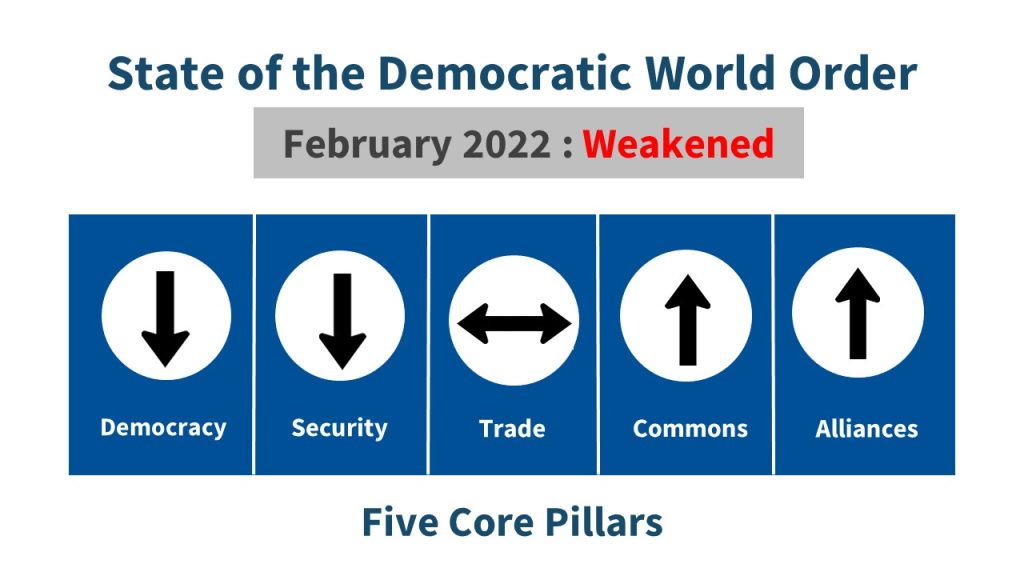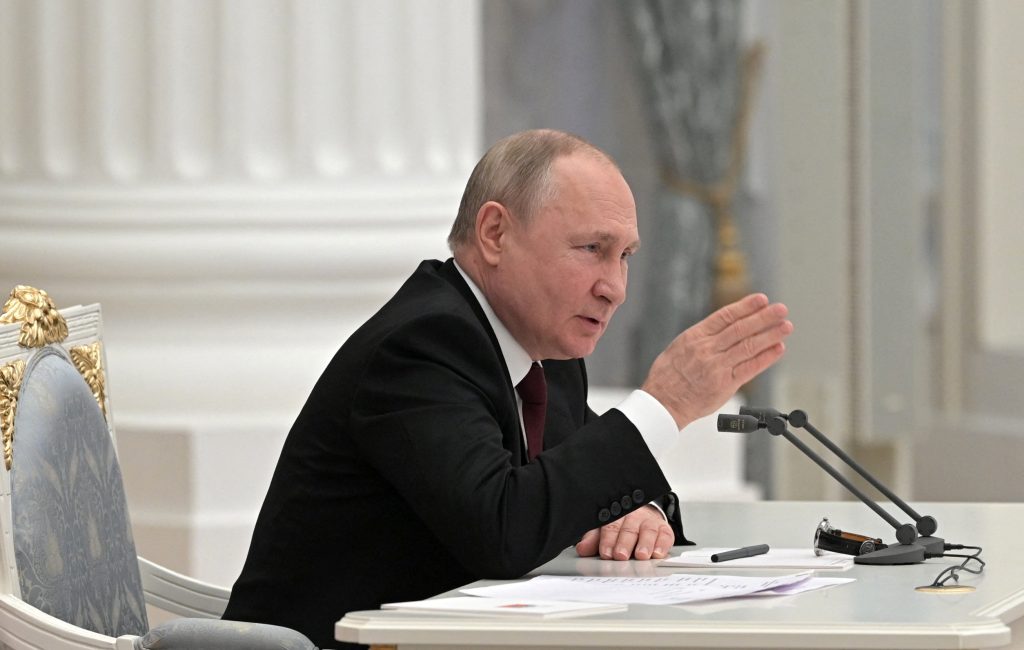Reshaping the order
This month’s topline events
Russia Invades Ukraine. Russian military forces began an all-out assault against Ukraine, launching missiles and rockets across the country and rolling in tanks and military vehicles from multiple directions. As Ukrainian president Volodymyr Zelenskyy appealed for military assistance, NATO allies condemned the invasion and bolstered deliveries of anti-aircraft and other weapons systems to Ukraine. Despite a seemingly overwhelming concentration of military power, Russia suffered significant losses and operational difficulties, failing to take control of the skies or major cities, as Ukrainian forces thwarted Russian president Vladimir Putin’s plans for a quick military victory.
- Shaping the order. Russia’s unprovoked assault on Ukraine constitutes an egregious violation of a fundamental norm of the rules-based order – the prohibition of aggression against sovereign states. Putin still appears intent on replacing Ukraine’s pro-Western government with a pliant regime, extending the Kremlin’s control over Ukraine and reconstituting a sphere of influence over post-Soviet states. Despite early setbacks, Putin may yet succeed in achieving his military aims. But his actions have had the effect of unifying the NATO alliance and much of the world against Moscow and have already resulted in devastating economic impacts for Russia.
- Hitting home. Putin’s war against Ukraine is precipitating a strategic challenge and humanitarian disaster at a scale not seen in Europe since World War II – a reminder to Americans that the US commitment to NATO is vital to defending democracy and protecting American security interests in Europe.
- What to do. As Ukrainian forces fight back against Russia for what could be a lengthy battle, NATO allies should maintain and expand delivery of military equipment to Ukraine, while bolstering efforts to provide humanitarian assistance to refugees seeking to escape the war.
Allies Unite on Sanctions. In response to Russia’s attack against Ukraine, the United States, joined by the European Union, Britain, Canada, Japan, Australia, and several others, imposed a sweeping and unprecedented package of sanctions against Russia. This includes implementing travel bans and asset freezes against Putin, his inner circle, and several Russian oligarchs, freezing over half of Russia’s central bank reserves, and severely limiting Russian financial transactions with the West. In a significant move, Germany agreed to scrap the controversial $11 billion Nord Stream 2 gas pipeline that was set to deliver Russian gas to Europe, as part of a broader measure by the US and Europe to curtail imports of Russian oil, gas, and coal.
- Shaping the order. The scale of sanctions and the large number of multinational companies pulling out of Russia triggered a domestic financial crisis and is causing major damage to the Russian economy. While unlikely to change Putin’s calculus in the short run, they have imposed robust and likely unexpected penalties for his decision to invade Ukraine and may help intensify pressure on Putin to end the war.
- Hitting home. With sanctions already having an impact on global energy prices, the economic repercussions for American consumers could be significant – though initial opinion polls suggest broad support for Ukraine even at the cost of higher gas prices.
- What to do. The Biden administration should coordinate with allies to deepen sanctions against Russia, including on the Russian stock market and investment flows, and seek wider support for sanctions around the world to increase pressure on Moscow to withdraw its forces and seek a settlement of the crisis on terms acceptable to Ukraine.
China-Russia Manifesto. While visiting Beijing just ahead of the Winter Olympics, Putin joined Chinese president Xi Jinping in issuing an extraordinary joint statement pushing back against key tenets of the democratic world order. The lengthy manifesto rails against Western interference in the “internal affairs” of other nations and calls for an end to NATO expansion – the first time that China has publicly supported Russia’s position on this issue. Asserting that the friendship between the two nations “has no limits” and “no forbidden areas of cooperation,” the statement affirms their intent to deepen cooperation on an encompassing range of economic, political, and security issues.
- Shaping the order. The statement stands as a dramatic show of solidarity between the leaders of Russia and China and could mark a key inflection point in shaping the global order. With both nations expanding cooperation in recent years, the statement may become the basis of a closer strategic partnership and perhaps even a future security alliance between Beijing and Moscow – an “axis of autocracy” – as they attempt to push back on the US-led rules-based order.
- Hitting home. The intensifying strategic competition between the West and China and Russia will have direct implications for American businesses, which will need to look at ways to reduce vulnerabilities to Chinese and Russian markets as pressure toward economic decoupling continues to build.
- What to do. While some analysts have suggested that now is the time to seek to sow divisions between Moscow and Beijing, the United States would be better served by simultaneously countering the challenges to the rules-based order posed by both China and Russia and working with allies and partners to prepare for a long-term strategic competition across a range of domains.
Quote of the month
“When the history of this era is written, Putin’s choice to make a totally unjustifiable war on Ukraine will have left Russia weaker and the rest of the world stronger. Liberty, democracy, human dignity – these are the forces far more powerful than fear and oppression. They cannot be extinguished by tyrants like Putin and his armies… And in the contest between democracy and autocracy, between sovereignty and subjugation, make no mistake: Freedom will prevail.”
– President Joe Biden, February 24, 2022

State of the Order this month: Weakened
Assessing the five core pillars of the democratic world order
Democracy (↓)
- As discussed above, Russia launched a full-scale invasion aimed at toppling the democratically elected government of Ukraine, which is in the midst of fighting for its very survival.
- According to Freedom House, which released its annual Freedom in the World report, the world became less democratic in 2021, marking the 16th consecutive year of democratic decline.
- With Russia’s invasion of Ukraine, the democracy pillar was weakened.
Security (↓)
- Russia’s invasion of Ukraine marked the most significant assault on European security in decades. In an apparent effort to deter NATO’s involvement, Putin announced that Russia has placed its nuclear forces on high alert.
- In a pointed reversal of policy, Germany announced that it would supply Ukraine with anti-tank weapons and surface-to-air missiles, while beginning to increase its defense budget to reach more than 2% of its GDP.
- The White House released a new Indo-Pacific Strategy that calls for deepening regional security partnerships and closer collaboration with allies, including on emerging technologies, to counter China.
- Due to a breakdown in relations with Mali’s new military junta, which seized power in a 2020 coup, France announced a full withdrawal of its troops from Mali, which had been deployed to help fight jihadists in the region.
- With Russia’s invasion of Ukraine, the security pillar was weakened.
Trade (↔)
- The war in Ukraine and the imposition of sweeping sanctions against Moscow sent ripples through the global economy, and it could mark the beginning of a sustained economic decoupling, at least in key sectors, between the free world and Russia.
- Canada and Japan, as well as Taiwan, joined in support of the EU’s case against China at the WTO for blocking Lithuanian products in retaliation for Lithuania’s decision to allow Taiwan to open an office in its own name, bringing the entire G7 behind the EU in its escalating trade dispute with Beijing.
- Overall, the trade pillar was unchanged.
Commons (↑)
- COVID restrictions were reduced or eliminated across much of the United States, Europe, and other countries around the world, as the number of new COVID-19 cases marked a precipitous decline.
- As part of a coordinated effort to isolate Russia, the United States, Canada and most European countries closed their airspace to Russian commercial flights.
- Meeting at a “One Ocean Summit” in France, the EU, Britain, Canada, and India launched a coalition for a high seas treaty to protect and govern the world’s oceans, while the United States and France jointly called for an ambitious global agreement to reduce plastic waste.
- With the coronavirus on the decline, the global commons pillar was strengthened.
Alliances (↑)
- As described above, NATO allies, joined by Japan, Australia, South Korea, and others, stood united in condemning Russia’s invasion of Ukraine, while providing significant military assistance to Kyiv and imposing a slate of hard-hitting sanctions against Moscow.
- India became the only democratic nation to refuse to support a UN Security Council vote condemning Russia for its invasion of Ukraine, joining China and the United Arab Emirates in abstaining. Most of the free world joined together in a subsequent resolution in the UN General Assembly condemning the Russian invasion, though notably South Africa also chose to abstain.
- On balance, the alliances pillar was strengthened.
Strengthened (↑)________Unchanged (↔)________Weakened (↓)
What is the democratic world order? Also known as the liberal order, the rules-based order, or simply the free world, the democratic world order encompasses the rules, norms, alliances, and institutions created and supported by leading democracies over the past seven decades to foster security, democracy, prosperity, and a healthy planet.
This month’s top reads
Three must-read commentaries on the democratic order
- Anne Applebaum, in The Atlantic, asserts that the primary reason Putin was prepared to invade Ukraine is because he wants democracy to fail – in Ukraine and beyond.
- Ivo Daalder, in Foreign Affairs, contends that the US and its democratic allies need to return to a strategy of containment against Russia that eventually brings the brutal regime of Vladimir Putin to an end.
- The Washington Post editorial board suggests that Putin and Xi, in issuing their joint manifesto, are seeking to make the world safer for their dictatorships, and that Western democracies must be determined to counter them.
Action and analysis by the Atlantic Council
Our experts weigh in on this month’s events
- Fred Kempe, in CNBC, suggests that Russia and China’s joint statement makes common cause, and could even serve as a de facto security alliance, with aspirations of shaping a new world order.
- Barry Pavel, in MarketWatch, outlines steps that NATO members should take, including closer cooperation among democratic allies and greater US reliance on nuclear deterrence, to counteract Russia’s “triple threat.”
- Dan Fried and Alina Polyakova write in Foreign Affairs that as long as Putin is in charge, there will be no going back to a stable and predictable Russia nor international order.
- Melinda Haring, in USA Today, envisions three scenarios for what’s to come in Ukraine and Europe following Russia’s invasion.
- Matthew Kroenig, in Foreign Policy, asserts that the United States needs to develop a defense strategy capable of deterring threats from Russia and China simultaneously.
__________________________________________________
The Democratic Order Initiative is an Atlantic Council initiative aimed at reenergizing American global leadership and strengthening cooperation among the world’s democracies in support of a rules-based democratic order. Sign on to the Council’s Declaration of Principles for Freedom, Prosperity, and Peace by clicking here.
Ash Jain – Director for Democratic Order
Dan Fried – Distinguished Fellow
Jeffrey Cimmino – Associate Director
Danielle Miller – Program Assistant
Otto Hastrup Svendsen – Georgetown Student Researcher
If you would like to be added to our email list for future publications and events, or to learn more about the Democratic Order Initiative, please email AJain@atlanticcouncil.org.
Image: Russian President Vladimir Putin chairs a meeting with members of the Security Council in Moscow, Russia February 21, 2022. Sputnik/Alexey Nikolsky/Kremlin via REUTERS ATTENTION EDITORS - THIS IMAGE WAS PROVIDED BY A THIRD PARTY.
